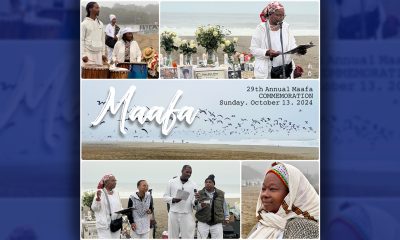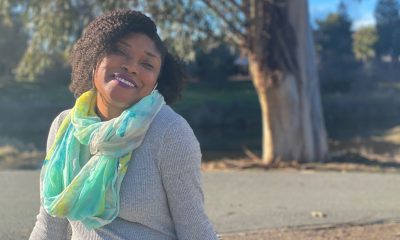Activism
Acknowledging Our Ancestars is Good for Our Souls
Ancestors are those in our maternal and paternal bloodlines born before us (in most cases) who have transitioned from the Earth to an invisible-spiritual-sky realm. We use ancestors interchangeably with Ancestars to honor some African ancients’ belief that our dearly departed return to the stars from which they came once they leave the Earth.

By Daktari S. Hicks, PsyD and
Monique “Kiki” Lyons, MA, AMFT
Except for some ceremonial moments and times, i.e., Kwanzaa, Juneteenth, Memorial Day, etc., we don’t think a lot about our ancestors.
Most of the time, in fact, we don’t think about those who walked in life before us and left footsteps for us to follow.
In many cases, we just bury them six feet under; or we cremate their physical bodies and scatter their ashes in a body of water or house them in an urn.
But are the dead really dead? As Black psychologists, we think not. The master Congo Nganga Dr. K. Kia Bunseke Fu-Kiau has taught us that we are seeds in a seed, from a seed, in a seed, from a seed ad infinitum.
We come and go and return and go and come back and go and come continually. As Black psychologists, we do believe in the continued existence, spirit, and power of our Ancestors, the invisible ones, or the dwellers of heaven (the sky world).
Ancestors are those in our maternal and paternal bloodlines born before us (in most cases) who have transitioned from the Earth to an invisible-spiritual-sky realm. We use ancestors interchangeably with Ancestars to honor some African ancients’ belief that our dearly departed return to the stars from which they came once they leave the Earth.
Us Black folk also adopt chosen, non-blood related Ancestors due to their vital impacts on us while they were alive and long after they’ve gone. Ibaye (“blessings to ancestor”) Sir Duke Ellington, Marvin Gaye, Chuck Brown, and Billy Stewart, a few of our Chocolate City-DC ancestors, where Dr. Daktari was born and raised.
Ibaye Monica Renee Hastings-Smith, Dr. “Papa” Zakariya Diouf, Zeke Nealy, Kamau Amen-Ra, and Dr. Angelina Graham, some of our local Oakland community Ancestors.
Nana Peasant, a character from Julie Dash’s film “Daughters of the Dust” says, “The Ancestors and the womb … they’re One, they’re the same. Those in the grave, like those who’re across the sea, they’re with us. They’re all the same. The Ancestors and the womb are one … Call on those old Africans. They’ll come to you when you least expect them. They’ll hug you up quick and soft like the warm, sweet wind. Let those old souls come into your heart. Let them feed your head with wisdom that ain’t from this day and time.”
Our Ancestars are vital because they serve as ever-present driving forces that guide and direct us on our divine paths.
An African proverb states, “A wise will is dedicated to the Ancestors, for it’s them who gave you everything.”
With that notion in mind, we inherit the good, bad, ugly, and phenomenal from our ancestors via genetic, familial, psychical, spiritual, cultural, and social modes of transmission. Within our collective ancestral memory bank, we can tap into intergenerational memories/stories of distant Ancestors that impact how we think, feel, and act yesterday, today, and tomorrow.
We co-authors crossed paths in 2017 when our ancestors deemed it necessary while attending an ancestral veneration ceremony at Oya Nike’s Botanica in Berkeley, CA, led by Curandero/Santero/Palero Baba Ruben Texidor.
We continued along our shared ancestral journey in 2019 by participating in Lead to Life’s Guns to Shovels Ceremony at Oakland City Hall where we erected altars for the ancestors, drummed/danced for the orishas (deified ancestors in the Yoruba tradition), and witnessed fireworkers meld guns (used to take lives) into shovels, which were used to plant trees on reclaimed local Ohlone land.
Via public/private communal ceremonies, we learned to cultivate ancestral healing. We acknowledge, communicate, and collaborate with our beloved Ancestars in an effort to resolve their unresolved trauma and access our inherited legacies of dynamism, resilience, revitalization, spirituality, and vitality.
The ancestors are, in fact, you. Acknowledging our ancestors is to honor the best of ourselves. We are the ancestors come to complete what they left incomplete, to finish the song, to finish the dance step, to finish their task, to finish our elevation and affirmation.
We encourage you to reach out, connect with, and honor your ancestors for reciprocal rejuvenation by creating an ancestral altar in your home/community, offering them omi tutu (fresh water), giving them their flowers, cooking their favorite meal, playing their favorite songs, and paying attention to your dreams, which are the “voices of Ancestors.”
We also invite you to attend the Annual Maafa Commemoration Sunrise Ceremony at Ocean Beach, which typically occurs on the second Sunday of every October.
The Association of Black Psychologists (ABPsi) Bay Area Chapter is committed to providing the Post Newspaper readership with monthly discussions about critical issues in Black Mental Health. The ABPsi-Bay Area Chapter is a healing resource. Readers are welcome to join us at our monthly chapter meetings every 3rd Saturday via Zoom. We can be contacted at bayareaabpsi@gmail.com.
Activism
OP-ED: AB 1349 Puts Corporate Power Over Community
Since Ticketmaster and Live Nation merged in 2010, ticket prices have jumped more than 150 percent. Activities that once fit a family’s budget now take significant disposable income that most working families simply don’t have. The problem is compounded by a system that has tilted access toward the wealthy and white-collar workers. If you have a fancy credit card, you get “presale access,” and if you work in an office instead of a warehouse, you might be able to wait in an online queue to buy a ticket. Access now means privilege.

By Bishop Joseph Simmons, Senior Pastor, Greater St. Paul Baptist Church, Oakland
As a pastor, I believe in the power that a sense of community can have on improving people’s lives. Live events are one of the few places where people from different backgrounds and ages can share the same space and experience – where construction workers sit next to lawyers at a concert, and teenagers enjoy a basketball game with their grandparents. Yet, over the past decade, I’ve witnessed these experiences – the concerts, games, and cultural events where we gather – become increasingly unaffordable, and it is a shame.
These moments of connection matter as they form part of the fabric that holds communities together. But that fabric is fraying because of Ticketmaster/Live Nation’s unchecked control over access to live events. Unfortunately, AB 1349 would only further entrench their corporate power over our spaces.
Since Ticketmaster and Live Nation merged in 2010, ticket prices have jumped more than 150 percent. Activities that once fit a family’s budget now take significant disposable income that most working families simply don’t have. The problem is compounded by a system that has tilted access toward the wealthy and white-collar workers. If you have a fancy credit card, you get “presale access,” and if you work in an office instead of a warehouse, you might be able to wait in an online queue to buy a ticket. Access now means privilege.
Power over live events is concentrated in a single corporate entity, and this regime operates without transparency or accountability – much like a dictator. Ticketmaster controls 80 percent of first-sale tickets and nearly a third of resale tickets, but they still want more. More power, more control for Ticketmaster means higher prices and less access for consumers. It’s the agenda they are pushing nationally, with the help of former Trump political operatives, who are quietly trying to undo the antitrust lawsuit launched against Ticketmaster/Live Nation under President Biden’s DOJ.
That’s why I’m deeply concerned about AB 1349 in its current form. Rather than reining in Ticketmaster’s power, the bill risks strengthening it, aligning with Trump. AB 1349 gives Ticketmaster the ability to control a consumer’s ticket forever by granting Ticketmaster’s regime new powers in state law to prevent consumers from reselling or giving away their tickets. It also creates new pathways for Ticketmaster to discriminate and retaliate against consumers who choose to shop around for the best service and fees on resale platforms that aren’t yet controlled by Ticketmaster. These provisions are anti-consumer and anti-democratic.
California has an opportunity to stand with consumers, to demand transparency, and to restore genuine competition in this industry. But that requires legislation developed with input from the community and faith leaders, not proposals backed by the very company causing the harm.
Will our laws reflect fairness, inclusion, and accountability? Or will we let corporate interests tighten their grip on spaces that should belong to everyone? I, for one, support the former and encourage the California Legislature to reject AB 1349 outright or amend it to remove any provisions that expand Ticketmaster’s control. I also urge community members to contact their representatives and advocate for accessible, inclusive live events for all Californians. Let’s work together to ensure these gathering spaces remain open and welcoming to everyone, regardless of income or background.
Activism
Oakland Post: Week of December 31, 2025 – January 6, 2026
The printed Weekly Edition of the Oakland Post: Week of – December 31, 2025 – January 6, 2026

To enlarge your view of this issue, use the slider, magnifying glass icon or full page icon in the lower right corner of the browser window.
Activism
Big God Ministry Gives Away Toys in Marin City
Pastor Hall also gave a message of encouragement to the crowd, thanking Jesus for the “best year of their lives.” He asked each of the children what they wanted to be when they grow up.

By Godfrey Lee
Big God Ministries, pastored by David Hall, gave toys to the children in Marin City on Monday, Dec. 15, on the lawn near the corner of Drake Avenue and Donahue Street.
Pastor Hall also gave a message of encouragement to the crowd, thanking Jesus for the “best year of their lives.” He asked each of the children what they wanted to be when they grew up.
Around 75 parents and children were there to receive the presents, which consisted mainly of Gideon Bibles, Cat in the Hat pillows, Barbie dolls, Tonka trucks, and Lego building sets.
A half dozen volunteers from the Big God Ministry, including Donnie Roary, helped to set up the tables for the toy giveaway. The worship music was sung by Ruby Friedman, Keri Carpenter, and Jake Monaghan, who also played the accordion.
Big God Ministries meets on Sundays at 10 a.m. at the Mill Valley Community Center, 180 Camino Alto, Mill Valley, CA Their phone number is (415) 797-2567.
-

 Bay Area4 weeks ago
Bay Area4 weeks agoPost Salon to Discuss Proposal to Bring Costco to Oakland Community meeting to be held at City Hall, Thursday, Dec. 18
-

 Activism4 weeks ago
Activism4 weeks agoMayor Lee, City Leaders Announce $334 Million Bond Sale for Affordable Housing, Roads, Park Renovations, Libraries and Senior Centers
-

 Activism4 weeks ago
Activism4 weeks agoOakland School Board Grapples with Potential $100 Million Shortfall Next Year
-

 Activism4 weeks ago
Activism4 weeks ago2025 in Review: Seven Questions for Black Women’s Think Tank Founder Kellie Todd Griffin
-

 Arts and Culture4 weeks ago
Arts and Culture4 weeks agoFayeth Gardens Holds 3rd Annual Kwanzaa Celebration at Hayward City Hall on Dec. 28
-

 Advice4 weeks ago
Advice4 weeks agoCOMMENTARY: If You Don’t Want Your ‘Black Card’ Revoked, Watch What You Bring to Holiday Dinners
-

 Activism4 weeks ago
Activism4 weeks agoAnn Lowe: The Quiet Genius of American Couture
-

 Activism3 weeks ago
Activism3 weeks agoDesmond Gumbs — Visionary Founder, Mentor, and Builder of Opportunity

















































